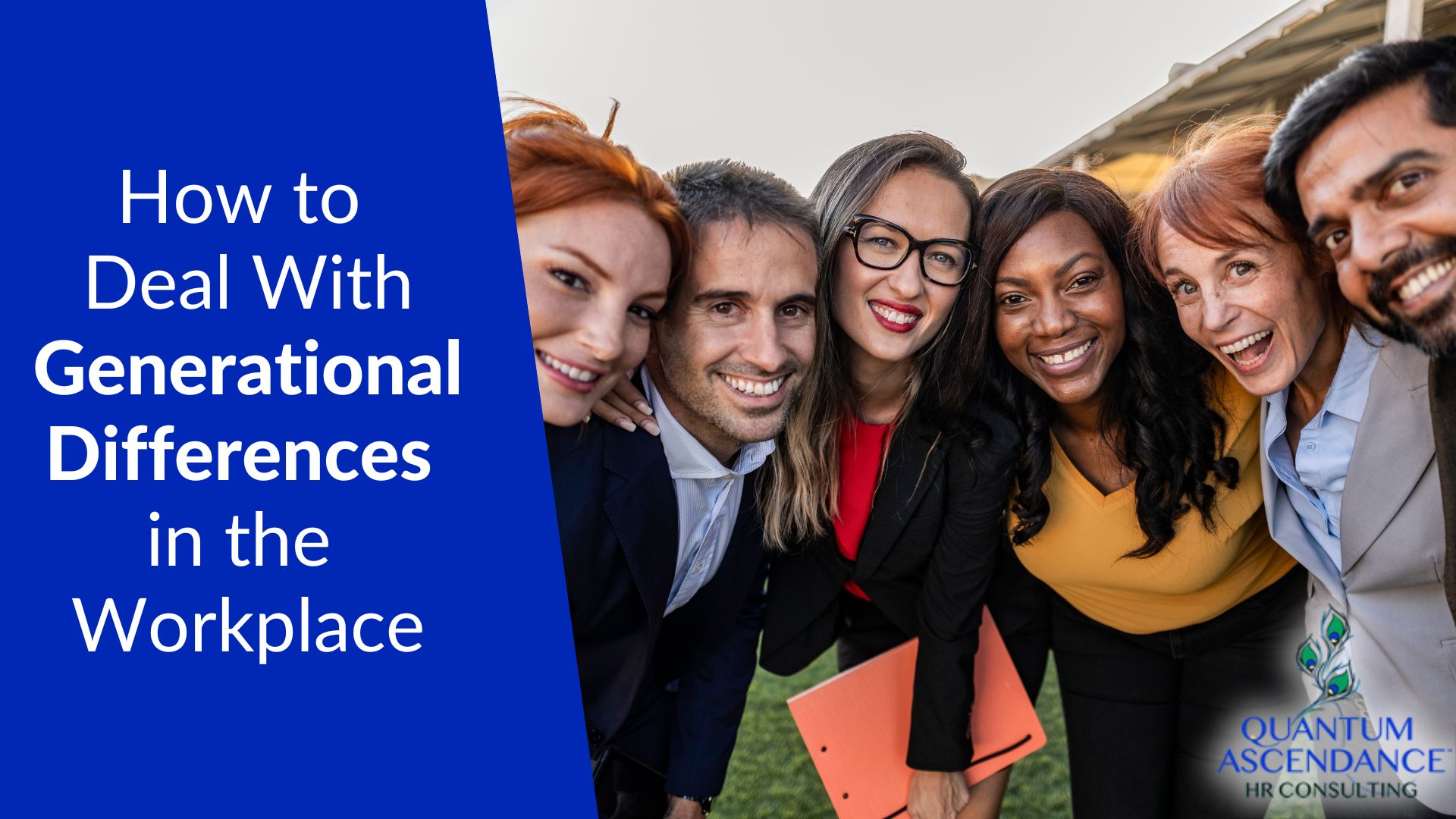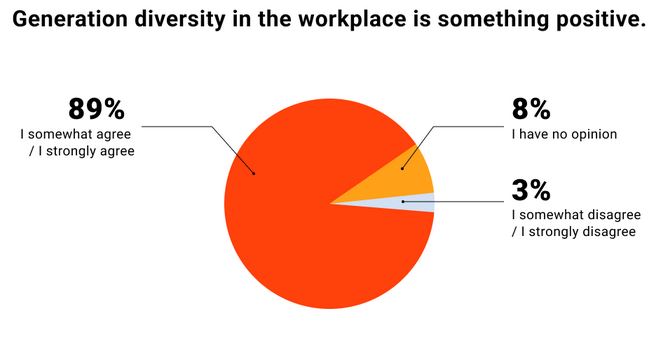
In this day and age, workplaces are more diverse than they ever have been.
And while this diversity offers a long list of benefits, it also poses a unique set of challenges, not least when it comes to generational differences in the workplace.
Like it or not, people from different generations often see the world from completely different perspectives. They work differently, communicate differently, and have different values, goals, strengths, weaknesses, and motivations.
So, naturally, people from different generations might not see eye to eye on some things, and this can end up causing a significant amount of conflict between colleagues.
But luckily, most people seem to see the value of generational differences in the workplace, despite admitting that these differences can also cause problems.
For example, a survey from LiveCareer of more than 1,000 American employees found that the vast majority of respondents are optimistic about generational diversity in the workplace, with 89 percent agreeing that it’s a positive thing, and 87 percent agreeing that it offers the chance for different generations to learn from one another.

What’s more, it found that the majority of respondents from all generations surveyed, including Gen Z, Gen X, Millennials, and Baby Boomers, said that if they were an employer, they would hire people from different generations.
At the same time, 78 percent of respondents agree that making different generations work together can lead to conflict.
At any rate, it’s good to see that even though most people agree that generational diversity can create conflict, they also believe that the benefits of generational diversity are worth its potential risks.
So, if you’re thinking about hiring people from different generations, dealing with issues related to generational differences in the workplace, or just want to learn more about how to deal with these issues, should they arise, then you should definitely keep reading.
Because in this article, I’m going to offer some advice on how to bridge the generational divide and ensure a harmonious relationship between all your employees, regardless of when they were born.
The Benefits of Generational Differences in the Workplace

After hearing about the potential for conflict when it comes to generational diversity, you might be on the fence about whether or not this is a good thing.
But the fact of the matter is, the benefits of generational diversity in the workplace far outweigh the risks, and I feel like it’s important to emphasize this.
That being said, below I’ve provided a list of the benefits of generational differences in the workplace, as a reminder for those of you who are still not sure about this sort of thing.
Innovation through Diversity
Generational diversity injects a diverse array of ideas and approaches into the workplace.
Baby Boomers bring their wealth of experience and institutional knowledge, while Gen X offers adaptability and a balance between traditional and modern practices. Millennials and Gen Z offer fresh perspectives and digital proficiency.
This blend can help to spark innovative thinking by challenging conventional norms and encouraging creative solutions to complex problems.
Enhanced Problem-Solving
Combining the insights of different generations can lead to well-rounded problem-solving, as each generation approaches challenges from a unique angle, drawing from their distinct backgrounds.
And by tapping into this diversity of thought, your team can explore multifaceted solutions that might not have been apparent otherwise.
Mentoring and Knowledge Transfer
Older generations have accumulated years of wisdom in their respective industries, and their willingness to share this knowledge can be invaluable.
Implementing mentorship programs allows your more experienced employees to guide their younger counterparts, fostering skill development and enhancing succession planning.
Adaptability and Change Management
Younger generations are often early adopters of new technologies and changing trends, as they bring agility and comfort with things changing quickly. This can be crucial, especially in industries characterized by rapid technological advancements.
This adaptability can help your company to stay competitive and responsive to the demands of an evolving market.
Enhanced Communication
The varied communication styles of different generations offer an opportunity to develop more effective and inclusive ways of communicating.
And by having colleagues with different communication styles work together, you can help to bridge the gap between traditional face-to-face interactions and digital communication tools, which can lead to a more seamless exchange of ideas, along with increased collaboration and cooperation.
Collaboration and Learning
Intergenerational teamwork can help to foster mutual learning, as each generation has something to teach and something to learn from the others.
This collaboration enriches the professional growth of all team members, ultimately contributing to a more skilled and well-rounded workforce.
Customer Insights
With different generations come different consumer preferences and behaviors.
And when your team is made up of members from various age groups, this can offer a deeper understanding of your target audiences, leading to more tailored and effective marketing strategies.
Employee Engagement and Retention
Acknowledging and valuing generational differences in the workplace demonstrates an inclusive and respectful company culture.
As a result, your employees are more likely to feel valued and engaged, no matter how old they are, as they see their unique contributions recognized and appreciated.
Resourcefulness
Generational differences can help to increase the resourcefulness of your employees by preventing groupthink and tunnel vision, while encouraging them to challenge assumptions.
This results in more thorough exploration of potential problems, and how to solve them, along with better analysis of opportunities, and how to take advantage of them, leading to enhanced planning and problem-solving.
Cross-Generational Learning
While older generations share their expertise, they can also benefit from the fresh perspectives of younger colleagues.
This cross-generational learning ensures that skills and knowledge remain relevant and up to date for all your employees, regardless of their age.
How to Deal With Generational Differences in the Workplace

Now that you know about the benefits of generational diversity, and you’re aware of its potential risks, you’re probably wondering how you can deal with these kinds of issues.
With that in mind, below I’m offering ten of my best tips for how to bridge the generational divide between your employees, so you can have a better idea of how to go about managing different generations in the workplace.
Foster an Inclusive Culture
In order to avoid resentment, and people feeling left out, you’ve got to create an environment that values and respects the contributions of individuals from all generations.
You can do this by encouraging open dialogue, collaboration, and mutual understanding.
Encourage Knowledge Sharing
If you want to make the most of the diversity of expertise, skills, and experiences offered by different generations, you have to facilitate opportunities for them to share this knowledge.
This can be done through mentoring programs, cross-generational projects, knowledge-sharing sessions, or assigning some sort of buddy system between generations.
Emphasize Strengths and Skills
If you want to benefit from generational differences in the workplace, it’s important to recognize and leverage the unique strengths and skills that each generation brings to the table.
That being said, you should take every possible opportunity to encourage intergenerational teams to work together, combining diverse perspectives to achieve common goals.
Don’t Tolerate Stereotyping
Whatever you do, make sure you and your employees avoid stereotyping people based on their age or what generation they fall into.
There should be zero tolerance for this kind of behavior, and you should make a point of calling out anyone who does this sort of thing.
Provide Continuous Learning and Development
If possible, you should also offer training and development opportunities that cater to the learning preferences and needs of employees across different generations.
This can help bridge any skills gaps and keep everyone engaged and up to date with the latest trends.
Adapt Communication and Learning Styles
Different generations have varying preferences when it comes to communication.
So, whether it’s face-to-face interactions, email, Zoom, or other collaborative tools, like Slack or Discord, make sure to be flexible and adapt your communication approach to accommodate different styles, and encourage your employees to do the same.
Also, keep in mind that people can be auditory, visual, or kinesthetic learners, so depending on the preferences of your employees, a PowerPoint might be most effective, whereas in other cases, just an email might be okay.
Encourage Cross-Generational Mentoring
Another great way to deal with generational differences in the workplace is to establish mentorship programs where employees from different generations can learn from one another.
This can help you to address knowledge gaps, foster understanding, and promote a sense of camaraderie among your employees.
Focus on Outcomes, Not Methods
People from all walks of life have vastly different ways of doing things, and this is especially true for those who are of different generations.
So, instead of dictating how work should be done, it’s better to focus on setting clear expectations and outcomes. Provide as much autonomy to your employees as you can, allowing them to determine the best methods and approaches to meet expectations and achieve the outcomes you’re looking for.
It’s also important to offer flexible work schedules whenever possible, as some people work better in an office, while others are more productive when working from the comfort of their home.
Lead by Example
If you want to minimize any friction between employees from different generations, make sure to demonstrate inclusive behaviors and respect for all generations.
Do whatever you can to model open-mindedness, flexibility, and appreciation for diverse viewpoints, while encouraging everyone else to do the same, especially those on your leadership team.
Address Conflicts Proactively
No matter what happens, you’ve got to be proactive when addressing conflicts that arise as a result of generational differences.
Always encourage open and respectful discussions, mediate conflicts whenever necessary, and seek win-win solutions that consider the perspectives of all parties involved.
Are you struggling to deal with generational differences in the workplace? Contact us today to find out how we can help.
Business Leadership, Team Management